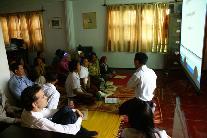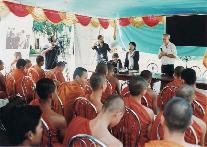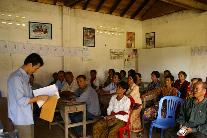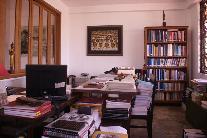ASIA
The Documentation Center of Cambodia (Cambodia)
(March 10, 2009)
by Youk Chhang, DC-Cam Director
The Documentation Center of Cambodia (DC-Cam) was created in 1995 as the field office for Yale University's Cambodian Genocide Program (CGP). The Center began collecting and researching all materials related to the Khmer Rouge regime, the political group responsible for Cambodia?s four-year genocide. In 1997, the Center became an independent research institute and soon after, the world's largest repository of Khmer Rouge-related documents. A great deal of DC-Cam's archives, research analyses, and official publications can be accessed online free of charge.
The two main objectives of DC-Cam are memory and justice. By researching and documenting the atrocities of Democratic Kampuchea, the Center hopes to preserve the memory of the genocide in honor of those who died and for future generations. The enormous amount of data collected and analyzed can also serve as evidentiary material in the prosecution of Khmer Rouge leaders thereby allowing victims a sense of justice. DC-Cam has established various projects in order to meet these important ends, one of which is exhibition activity.
To date, the Documentation Center of Cambodia has held various exhibitions, many of which can now be seen at Tuol Sleng Genocide Museum, a partner of the Documentation Center of Cambodia since the inception of the Center. Two of the photo exhibitions were installed during 2003 at the Tuol Sleng Genocide Museum (one on Former Khmer Rouge during DK and Today and the other on the regime?s top leaders) continue to be displayed. In 2005, we mounted an exhibition called Stilled Lives, a photo essay on the lives of 51 former Khmer Rouge. This exhibition was shown at Tuol Sleng and Rutgers University in the United States.
At the international level, we have supplied the Washington State Genocide Museum, the Chicago Killing Fields Museum, the new Rwanda Genocide Museum, Brazil?s Instituto Sergio Motta, and several individuals with photographs that have been used in exhibitions.
One of our recent exhibition activities was an exhibition of a set of exceptional photographs taken by Gunnar Bergstrom, one of the rare delegates allowed to visit Democratic Kampuchea in August 1978. Bergstrom returned to Cambodia for the first time in November 2008 and, together with the mobile exhibition, visited places he visited in August 1978. He spoke to hundreds of Cambodians and foreigners in Phnom Penh and a number of provinces. In addition, an exhibition of Bergstrom's photographs from 1978 has been displayed permanently at Tuol Sleng Genocide Museum and briefly at Reyum Arts Gallery in Phnom Penh. The Documentation Center of Cambodia, as a result of those photographs, has published a book called Living Hell, Democratic Kampuchea August 1978. The book can be viewed via the Center's website at www.dccam.org.
In the near future, DC-Cam will put up a permanent exhibition similar to what has been done at Tuol Sleng after the DC-Cam permanent center was built. The purpose of this exhibition is to remember those who lost their lives to the Khmer Rouge and to present the Khmer Rouge history to national and international audiences through interviews, film, photos, documents, flyers, and other artifacts.
Between 2009 and 2011, the Documentation Center of Cambodia (DC-Cam) proposes to promote memory, justice, and reconciliation in a number of different ways. Our focus is on ordinary Cambodian people--the victims and their descendants--whose voices must be heard loudly in any discussion of the country?s past, present, and future. In addition to honoring those who died during the Khmer Rouge regime, it is crucial to reach out to and support living Cambodians, in the country and across the globe. This summary Strategic Plan outlines how DC-Cam will attempt to create enduring mechanisms to help overcome the shadows of Khmer Rouge terror and build a brighter future in Cambodia.
I. A Physical Legacy
DC-Cam has begun to build a permanent center to expand our work and ensure a long-term commitment to human rights and genocide prevention in Cambodia. The Cambodian Ministry of Education has generously provided us with a large parcel of land in Phnom Penh for that purpose. The land, which totals nearly 4,800 square meters, is situated on the campus of the Beong Trabek High School, fittingly on the site of a former Khmer Rouge prison. We plan to break ground for a new building complex in 2010.
II. A Legacy of Memory
Genocide education is crucial if Cambodians are to preserve their history and remember those who perished under Khmer Rouge brutality. Education is also essential if Cambodians are to understand why and how the genocide happened, appreciate the effects of the tragedy, and address the many continuing challenges that flow from the genocide. DC-Cam is currently in the process of working with the Ministry of Education and academic experts to establish a core curriculum on genocide and other crimes against humanity, which will be introduced to Cambodian classrooms at the end of 2009. Together with local and international experts, we are providing in-depth training to 24 Cambodian officials, who will serve as leaders in genocide education. They, in turn, will train 185 educators to lead efforts in various districts throughout Cambodia. We will also host roughly 3,000 secondary school teachers from around the country for shorter basic training programs.
Our curriculum and training program will revolve around DC-Cam's history textbook The History of Democratic Kampuchea. Our textbook has received plaudits from around the country and the world. It is the first of its kind, educating Cambodian youths about the Khmer Rouge tragedy after three decades of relative silence on the subject in Cambodia?s schools. It is also available in digital format on the Internet, therefore reaching a global audience.
III. A Legacy of Justice
Making Our Documents Available Worldwide: Another way DC-Cam will promote memory and justice, at home and abroad, is to digitize over 900 reels of microfilmed documents from our archives.
Toward that end, we also maintain strong collaboration with the Tuol Sleng Genocide Museum. A further goal of our work is to expand the legacy of justice underway at the Extraordinary Chambers in the Court of Cambodia. DC-Cam plans to conduct a study relating to the crimes committed by lower ranking Khmer Rouge cadres. The study will trace various abuses that occurred under the Khmer Rouge regime, looking into the less-researched area of crimes by lower-level members of the regime. In fact, DC-Cam has conducted thousands of interviews of former Khmer Rouge officials and cadres since 2001, with support from the Ministry of the Interior. The study will provide victims, some of whom may feel disconnected from the ongoing criminal process and upcoming tribunals, with an opportunity to testify about their own experiences, and thus come to terms with their past. Like South Africa?s Truth and Reconciliation Commission, the study hopes to focus not on placing blame on particular individuals, but rather giving victims a chance to speak and be heard--a crucial step towards national reconciliation and justice.
Finally, DC-Cam will seek approval from the Royal Government of Cambodia to convene a forum commemorating the passage of key human rights laws. In particular, we intend to highlight the Genocide Convention, the watershed treaty that condemned and prohibited genocide sixty years ago. We also intend to draw attention to the recent ASEAN Human Rights Convention. We hope to lead a forum in collaboration with the Cambodian government, which adopted the Genocide Convention in 1950 and signed the ASEAN Human Rights Convention on December 10, 2008. The former represents one of the bedrocks of modern international human rights law, while the latter expresses a renewed regional commitment to basic human rights and dignity.
The proposed forum will include local and international participants and serve to illuminate the critical continuing need to promote human rights and prevent genocide, in Cambodia and beyond. We hope that the forum will also establish a community of scholars, advocates, officials, and others from inside and outside of Cambodia to carry on that mission. DC-Cam aims to serve as a principal hub in Asia to ensure that atrocities like those in Democratic Kampuchea never happen again.
Address: P.O. Box 1110 66 Sihanouk Blvd., Phnom Penh, CAMBODIA
Phone: +855-(0)23-211-875
Homepage: http://www.dccam.org
Days closed: Saturdays, Sundays, and National Holidays
Admission: Free
(Originally published on March 2, 2009)
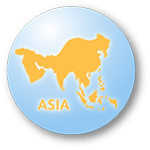 Peace Museums of ASIA
Peace Museums of ASIA
